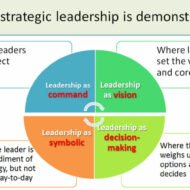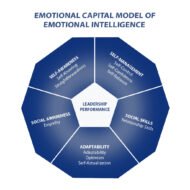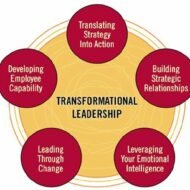Posted by Managementguru in Business Management, Human Resource, Leadership, Strategy
on Sep 8th, 2014 | 0 comments

Strategic Leadership in Organizations Every person is bestowed with innumerable opportunities through-out his/her life time. Very few are able to identify those angelistic gateways to success; I don’t agree with the age-old saying “Opportunity knocks the door only once.” In this dynamic world we are in a position to create opportunities and build our businesses around to witness our dreams turning into reality. What is strategic leadership? Have you got the spark in you? What started as a small spark of starting an online book store has instigated Sachin and Binny Bansal to build the top most online retail selling platform Flipkart. Bharat Matrimony founder Murugavel Janakiraman identified the unexplored niche of prospective marriage alliances over the internet by creating an online portal which facilitated girls and boys to project their profiles suitably and search for the man or woman of their dreams with ease minus embarrassment. A spark or an idea is what is needed to get into the groove to achieve something that delivers value not only to the creator but to the public over a period of time. Strategic leaders are not born, they are definitely made; they learn from their mistakes, have an eye for chances, molded by the environment they are exposed to and groom themselves to adapt to the setting. What is Strategic Leadership? Strategic leadership provides the vision and direction for the growth and success of an organization. A strategic leader institutionalizes a vision and helps the members of the organization to learn how to convert the objectives into action. A strategic leader also helps to sustain the momentum and interest of the people working under him by exuding the passion towards accomplishing the objectives in the long run. Organizations steered by strategic leaders are more successful in learning, both at the individual and group levels. Both the administrative and visionary traits of leadership are essential for organization-wide learning initiatives to succeed. The organization always needs to learn new things and at the same time, to systematize newly discovered approaches of learning. Strategic leaders believe human capital as an important factor in innovation and the creation of core competencies, and they invest considerable effort sustaining the health of this resource. These leaders attach consideration in building their organization’s resources, capabilities and competencies in order to gain appropriate, sustained competitive advantages. Strategic leaders very well know that focusing on the short term and forgetting about core competencies in the face of changing circumstances will prove to deliver disastrous results. Top Ten Characteristics of a Strategic Leader: Mission focusedAbility to see the big pictureCapable of matching organization’s objectives with the changing environmentCreative approach to problem solvingFuturistic thinkingEmotionally IntelligentBuild a strong team of capable peopleClear about their choicesCombine analytical vigor with serendipityExcellent communicators 3 Key Responsibilities of Strategic Leadership Take Responsibility for Vision, Alignment and DeploymentCreate a Culture of EmpowermentBuild...

Posted by Managementguru in Business Management, Decision Making, Entrepreneurship, Human Resource, Organisational behaviour, Principles of Management
on Mar 20th, 2014 | 0 comments

Emotional Intelligence for Effective Inter Personal Relationships What is Emotional Intelligence : an ability or capacity to perceive, assess, and manage the emotions of one’s self, and of others. Role of Emotions: Emotions play a critical role in organizations where there is a need for people to work in groups or teams. A leader who is strong in mind and thoughtful can perceive, observe and direct the emotions of the team members through proper channels. Such a leader is said to be “emotionally intelligent”. No! It is not about intelligence quotient but emotional intelligence. Empathy is the ultimate quality expected in leaders and managers rather than being rated high in the IQ scale.The capacity to perceive, scrutinize and manage one’s own emotions and that of others is one major factor of advantage in the concept of emotional intelligence. An emotionally intelligent person can institutionalize and manage change as well as make powerful decisions. Grooming of Human Mind and Skills: Human resource management throws up a real challenge to corporate organizations, where human minds and skills have to be groomed for the purpose of transcending their performance to remarkable levels in order to satisfy the production requirements. This is possible only when an organization has a leader who can draft and amalgamate the process of relationship management and skill development without a glitch for the benefit of the organization . Transformational leadership with constructive attitude and open approach is well appreciated and accepted by the worker force. What are the distinct features of emotional intelligence? High perception Being insightful Sensitive to the needs and requirements of the employees Self-control Self-awareness Open communication Empathy Change management skills Effective decision making Ever sanguine Instrumental in developing interpersonal skills Breaks the conventional rules Aggressive and daring in his approach Socially popular and easily gain acceptance Motivation driver The rational quotient behind emotional intelligence helps people to think and act smart even during nerve-racking situations.Emotional intelligence helps people to think and act in a logical manner in stressful situations that can divert their energy into positive thinking. A leader with high emotional intelligence can work efficiently with his team members. The spirit of exuberance from the leader acts as a positive signal and takes the pressure off the employees’ mind. It is this ability to identify and understand the emotions of people working under him makes him a comrade rather than a commando. Why EI is Necessary? Emotional intelligence is necessary for top level executives at management level to stand out and succeed. An ordinary employee who does mundane job everyday is expected to be technically sound and well-trained. The same criterion can never be applied to a manager or a chief executive who is bound to manage both formal and informal teams working under the same roof. Only persons who are emotionally sound can uphold the proceedings with dynamism and verve. By motivating human personnel you can get things done in a smooth manner: Give them a fresh start to prove themselves in case if they fail at the first attempt Anger management of self/others Channelize the emotions of self/others and create positive vibes Perceive the problems from various angles to get a complete picture Understanding the root of the problem Treating work as fun Thinking out of the box – parallel thinking and creative thinking must be encouraged amongst the employee group. People with high emotional intelligence are the ones needed in business community as big corporate organizations always find it difficult to manage human resource. The management has to devise a system that takes into account the intricacies of human mind and assigning right people to handle the perplexities....

Posted by Managementguru in Change management, Decision Making, Entrepreneurship, Human Resource, Leadership, Principles of Management
on Mar 19th, 2014 | 0 comments

Transformational Leadership What is Transformational Leadership: a leadership approach that causes change in individuals and social systems. Humans generally prefer to have a serene life without much hitches or hurdles in the way. Even if they are to witness a problem situation, they tend to pull themselves away from the scene of action to avoid consequences that may lead to complications at a later date. Very few are bestowed with qualities that make them appear exceptional to the eyes of ordinary men and women. Such people bring wonderful transformations in the lives of people, who willingly follow the leader and support the cause. Need for Transformational Leaders: In business environment, there has always been this debate, whether transformational leaders show success! But it has to be kept in mind that each component of transformational leadership has relevance for improving the decision-making process. In comparison, individually considerate leaders make sure that all parties to the problem are heard. Intellectually stimulating leaders reformulate with followers, colleagues, or superiors into more familiar and concrete terms, what may have begun as fuzzy. Inspirational leaders increase confidence and raise aspiration levels, that the problem can be solved once its causes have been determined. Decision-Making Styles: Leaders with idealized influence show their concern about the problem and the need for its solution. The common thread that emerges from the discussion on decision-making is that decision making styles may be primarily viewed as being based on logic or feeling and instincts. The rational and intuitive decision-making styles are generally considered in conjunction since they represent two ends of a continuum as observed through most studies. While making decisions, transformational leaders are more likely to Be proactive to incipient problems, anticipating the emergence of problems more frequently and farther in advance. Incremental, taking small steps toward problem solving without waiting for a guarantee of complete success. Willing to look at a problem in a larger context and longer time frame. Encouraging of search and choice that take into account the wider context of the larger organization and outside environment rather than limiting the search to the immediate neighborhood of the problem. Quick to react to emergent problems. Seeking information informally for making their decisions rather than prescribed by organizational rules. Practicing walk-around management to promote the upward flow of communication and information. Making decisions involving higher payoffs at higher risks rather than decisions that favor exploitation and achieve lower payoffs at lower risks. Willing to take failure in their stride. Rationale in Making Decisions: The rational style of making decisions is deliberate, analytical, and logical assessing the long-term effects of decisions and having a strong fact-based orientation. The intuitive style is feeling-oriented and based on internal ordering of information. Such decisions are made quickly. The dependent style is characterized by use of support from others while delay and denial characterize the avoidance style. The spontaneous style displays a strong sense of immediacy and an interest in getting through the decision-making process as quickly as possible. A transformational leader would more likely to make decisions rationally after considering carefully all the facts and information and spending a considerable time over the decision-making process. Transformational leadership will be positively related to rational, spontaneous and dependent decision-making styles, and will be negatively related to intuitive and avoidance decision making. The interaction effect of rational and dependent decision making styles on transformational leadership will be...






